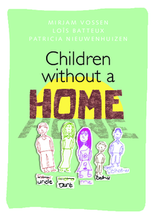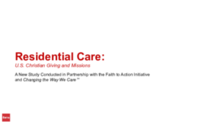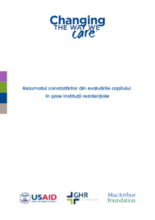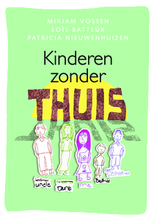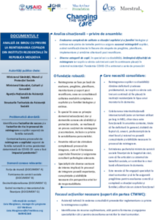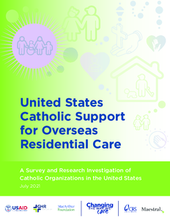Displaying 121 - 130 of 1510
Millions of children in developing countries are unable to live at home for a variety of reasons. The fate of these children is a concern for many people. Some start projects, volunteer with children or support an orphanage. This guide is for them. It is also important for organisations that do not specifically focus on vulnerable children. Because children without sufficient paren-tal care are everywhere: in schools, villages and poor areas in big cities.
This report contains the findings from a nationally representative study conducted by Barna Group of U.S. Christians to better understand U.S. Christian beliefs around and support for orphanages, children’s homes and other forms of residential care for children. It includes data on the amount of funding given to residential care, as well as visits and short-term missions to orphanages.
Scopul evaluării individuale a 184 de copii din șase instituții rezidențiale este de a obțineinformația actualizată privind indicatorii demografici și situația socială, educațională,psihologică și medicală a copiilor plasați în instituțiile rezidențiale pentru a planificareintegrarea lor în mediu familial și/sau pregătirea pentru tranziție de la servicii deîngrijire de tip rezidențial la îngrijire de tip familial.
Adolescents living in residential youth care (RYC) are at risk for disadvantaged social relationships, which in turn present a risk factor for increased loneliness. Social relationships of Slovenian adolescents aged 15–18 years and living in RYC group homes or in their primary families were investigated by relying on the social convoy framework.
Miljoenen kinderen in ontwikkelingslanden kunnen tijdelijk of langdurig niet thuis wonen. Soms omdat hun ouders zijn overleden of omdat de problemen thuis te groot zijn. Soms omdat ze zijn weggelopen of van hun familie gescheiden door oorlogen, rampen of kinderhandelaren. Het lot van deze kwetsbare kinderen gaat veel mensen aan het hart. Ze starten een project, doen vrijwilligerswerk met kinderen of ondersteunen een weeshuis.
Voor hen is Kinderen zonder ‘thuis’ bedoeld.
This webinar, the fifth in the Transforming Children's Care Webinar Series focused on a new study ('Impact of COVID-19 on Privately Run Residential Care Institutions: Insights and Implications for Advocacy and Awareness Raising'). The study, comprising 21 semi-structured interviews across seven focus countries, explores the effect of COVID-19 on a small number of privately run and funded residential care institutions.
Research suggests that children develop best in families, but millions currently reside in residential care centers. Using a mixed methods design, the current study examined (1) antecedents to transition, (2) key elements in the process and (3) outcomes of transitioning models of care.
A fost efectuată o analiză de birou a studiilor de reintegrare din Moldova și a orientărilor globale pentru a identifica succesul și factorii de risc în cadrul procesului, precum și lecțiile importante învățate.
A fost efectuată o evaluare cuprinzătoare a copiilor și adolescenților care trăiesc în îngrijire rezidențială identificând că există un mecanism complex de evaluare, axat pe oferirea unei vederi de 360° asupra nevoilor și interesului superior al copilului.
Changing the Way We Care (CTWWC) conducted a study on the support by U.S. Catholic organizations for overseas residential care of children in 2018. This report provides insights from the study on U.S. Catholic Church support for children’s residential care facilities outside of the U.S. Its data provides a foundation for building effective engagement and messaging strategies, as well as helps inform advocacy and influence work concerning support for family strengthening and care for vulnerable children by the U.S. Catholic community.

